Billy Henderson has devoted his life to the strange and secretive practice of helping athletes escape Cuba. To retrieve eventual Orioles infielder Cesar Prieto, he hatched a plan … and strapped on a GoPro.
Billy Henderson circles the Miami International Airport in a dark SUV, driving slowly, head on a swivel, hunting for anything amiss. Baby J is up there somewhere—in the sky, on an airplane, nervous beyond belief and soon to land. Billy believes his job—the strange, surreal gig he still hides from his family—always hinges on five critical minutes he can never predict beforehand. And he might get one chance to complete the mission. Might.
As he drives, he considers the target, a Cuban baseball player he refers to by that code name. Baby J had sent his travel itinerary over WhatsApp, and Billy had analyzed the airport’s layout and traffic patterns, along with the grid of the hotel the Cuban national team would bus to in West Palm Beach, Fla. He had diagrammed the plan on a white Krispy Kreme doughnut box, snapped a picture and sent it to Baby J.
From 35,000 feet, the recipient reviews the message while thinking through the risks he’s about to take. He says goodbye to teammates, without explicitly stating his intentions. He has never met Billy in person, nor the other two members of his very unlikely crew. And yet, Baby J believes in them, because of their track record, and because he sees no other choice. He knows that once he attempts to wriggle from the national team’s grasp, there’s, as he puts it, “no turning back.”

Erick W. Rasco/Sports Illustrated
The plane lands.
“Go time,” Billy says. He drops his mild-mannered disposition in favor of an enhanced state of consciousness. His appearance screams can-even-pull-off-tights, with muscles that strain the fabric on his T-shirts and legs that jut toward the ground like oak trees. He’s in character: hair short, suitcase packed and favorite guns—a pair of Colt 45s he calls The Twins—holstered. He says he has never used them on a mission, but they’re his protection in a dangerous and unpredictable profession—the one he’d like to quit, if only he knew how. “The kids we’re helping are like walking lotto tickets,” he says. “People do desperate things.”
Looping around the terminal, he might as well be meditating. “It’s the quiet moon before the storm,” he says. “Then everything opens up. I feel stronger, like I can do anything; doesn’t matter. I’m Superman”—if Superman donned a fanny pack rather than a cape.
There’s an art to navigating his job, to extracting. It starts with the essentials: 1) a pair of black Converse sneakers, his “lucky charms”; 2) The Twins and their “cousins”, his other guns; and 3) yes, what he calls his fanny pack. Billy is quick to describe his particular belt bag as “cool” and “Indiana Jones’’ adjacent, “not like a grandma or grandpa [version].” His is bigger, comes with a shoulder strap and is stuffed with items: passport, flashlight, an extra pair of Converse, white socks (always high, covering his calves), laptop (for missions and, oddly, day trading), cellphone, clothes, pocketknife and a snack. Even superheroes need their nourishment.
Passing the baggage claim on another loop, Billy spies a growing throng, news crews and dozens of Cuba fans. He notes a higher concentration of police officers and security guards than in previous days. While assisting a defector seeking asylum in the U.S. is not illegal, Billy doesn’t like the optics, doesn’t want to be stopped and forced to explain and lose the target. So he calls Jo Hastings, his boss and the operation’s mastermind. She’s inside, downstairs near the baggage claim, hiding in the crowd. Time to leave, he says, while sending Baby J a message: No airport. Don’t worry. Be cool.
Suddenly, there’s yelling from above, after someone spies the team not in the “arrivals” area, but upstairs in “departures.” The crowd splits, and fans rush toward the Cubans, with Jo following behind.
As Cuban players shuffle onto their ride, Jo shouts, “It’s a green bus!” into the phone. Billy pulls the SUV around.
“Let’s just follow,” he says.
As far as athlete extractions from Cuba go, there’s no manual, no database and, often, no rules. Most athletes turn to smugglers, hiring coyotes often linked with cartels and organized crime syndicates. Some climb on dangerous speedboats.
The athletes assume these risks for a number of reasons. They might not know of an alternative way out. They might know someone who escaped Cuba without harm. Mostly, though, those methods represent the fastest way from their old life to their new one. Still, there are risks. In 2012 outfielder Yasiel Puig was threatened and held for ransom in Mexico by the Zetas cartel. In ’13, José Abreu, a first baseman for the White Sox, used a fake passport to board a flight from Haiti to Miami, but ate it en route because U.S. law, at the time, allowed Cubans arriving without travel documents to stay. Those who fail in fleeing—like Yordenis Ugás, the boxer who didn’t successfully defect until his sixth attempt—get thrown into detention centers.
Seven years ago, Jo started her foray into this secretive corner of the sports world with a different thesis. A Cuban immigrant who had arrived in the U.S. with her family when she was 4, the issue was personal to her. She believed that there had to be a better way for athletes to defect—and that she, a restaurateur from Tampa with no experience, would be the one to find it.
The strategy she devised involved lawyers, time, safety precautions and a mountain of paperwork. Her preferred method is assisting defections to countries with friendly laws for establishing residency, like Mexico or Ecuador. There, the athletes will wait for months on end, impatience and desperation growing daily, as she works to obtain visas for legal entry to the U.S.
But even her way isn’t free of dangers. It stems from the waiting, combined with the value of the players she protects. To absorb those risks she needed Billy, a former college football player turned military and police officer.
He solved her issues. But over time, in doing that, he created a major problem of his own.
After missions are completed, Billy, now 39, moves into a cramped second-floor guest space at the Hastings’ home in Gulfport, Fla. The liberated athletes get the guest bedroom, and Billy, a floral-patterned couch.
When he leaves for a mission Billy tells his family, including his four children, ages 2 through 16, that he’s headed off to work with athletes—implying that he’s training them, which is partly true. He maintains that secrecy isn’t why he conceals the full nature of his gig, but because he doesn’t want anyone to tell him he should stop.
Billy’s job is divided into operations and their aftermaths. The operations are adventures filled with peril, adrenaline and satisfaction. Over the last seven years he says he has helped a dozen athletes escape Cuba for the U.S. He says that is the easy part, the “right thing.”
His angst rises only after the operations end. That’s when he transitions into a different type of job: minder/chauffeur/teacher/coach/security guard/cook/cleaner/trainer/medic/therapist/friend. “Anything to take care of human beings” is how he explains it. But altruism goes only so far.

Watch SI’s Three-Part Video Series
Episode I | Episode 2 | Episode 3
Billy is paid a monthly salary of $2,500, plus expenses, though he has received two notable bonuses: Jo paid off his mortgage after one successful caper and gave him the Mercedes SUV after another. But it’s hardly enough cash to live on, let alone to build any savings. So in his rare free time Billy also picks up side jobs—like bounty hunting for a friend who is a bail bondsman—as he waits for the vague and distant payout he imagines will come when he and Jo help free enough athletes who truly strike it big.
In those weeks that become months after missions, Billy’s hours fill with unease, regret and an existential dread. He considers his future—no 401(k), no benefits and no savings. Why do I do this? he wonders. Lying on that floral-patterned couch at night, Billy thinks: Man, everything I’ve done, and this is what it comes down to. I guess it ends like this. [No] end of the rainbow.
He tries to push those thoughts down, but they’re too heavy, even for a man who can bench more than 500 pounds. Alone at night, he wonders: In helping others reach their dreams, has he forsaken his own?
At the airport, Jo’s stomach swirls with anticipation and nerves. As she hops into the SUV idling outside the terminal, she tugs off a wig she wore as a disguise and kicks off her flip-flops.
It’s May 2021. Billy and Jo have been planning their latest caper since the beginning of the year. Sports Illustrated had chronicled one of their missions in ’19, but this time they agreed to film the action with a GoPro camera. For years Jo oversaw the actual operations from home. But not this time. She says something about Baby J compelled her to take a more up-close part. Billy thinks she wanted to feel how he felt—alive.
“I got this,” Billy says, as he heads north on I-95 toward West Palm Beach. Traffic turns a 70-mile ride into a nearly two-hour slog, but Billy is focused, on high alert, eyes darting, looking for small details that might signal anything amiss. At the same time as Jo, he detects one on the freeway: an agent who signs Cuban players in another car following the bus. Despite their agreement with Baby J, it’s no certainty he’ll leave with them. “He’s after Baby,” Jo yells. “Wow, somebody just like us.”
In light of the unexpected company, Billy makes an instant and critical decision: When they arrive at the hotel, they cannot wait. He explains the plan and his rationale to Jo. After sitting on that bus, whether hungry, in need of a stretch or immersed in their phones, team officials will be at their most relaxed upon arrival. “They’re thinkin’ they can breathe,” Billy explains.
“If it’s not now, it’ll be never,” he says to the woman sitting next to him, the one who long ago saved Billy, for better and for worse.
Billy grew up in Tampa, his father mostly absent, his mother often toiling at three jobs simultaneously to scrape by. At age 14, he decided he would help. He sped off on his bike, with a friend, pedaling through St. Petersburg and Gulfport and stopping in stores and restaurants to ask for work. At least 10 establishments said no. His friend was done, but Billy tried one more, opening the door to Habana Café and introducing himself to the owner, a woman with spiked hair who asked the obvious, his age. He lied, then reconsidered. She said no, then yes.
Billy didn’t know he had stumbled upon the owner’s soft spot. She rescued stray dogs and cats, made generous donations to local causes and never encountered a problem she didn’t try to solve. Jo told Billy to come back at 8 p.m.—and to never mention his age again. Billy washed dishes, bused tables, cut vegetables, made sandwiches, cleaned and took out the garbage. He never complained; in fact, he seemed happy. He quickly graduated to performing odd jobs at the Hastings’ house on the weekends, pulling weeds or moving boxes.
They grew close. At first Billy saw Jo’s “big hair” and sparkling jewelry and thought: rich white lady. Over time, though, she shared with him her backstory: how her family emigrated from Cuba and how she worked for three decades as a flight attendant, opened a Cuban restaurant and created a cream cheese flan recipe that was featured in cookbooks and won international awards.
Billy soon became part of the Hastings family. Aunt Jo, as he came to call her, invited him to Thanksgiving dinners, Christmas parties and Fourth of July celebrations. Her friends, their jobs and all of their opulence opened a window into a majestic world—the one Billy wanted to join.
Jo, now “a youthful 63,” she says, found Billy to be sociable and charming, willing and malleable. Jo and her husband, David, never had children, but Billy became like their adopted son. “He has never disappointed,” she says.
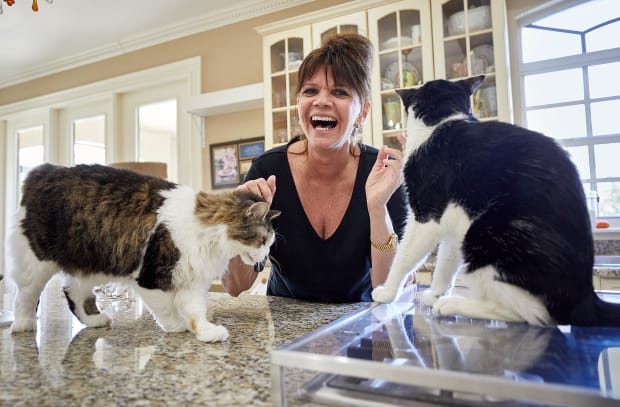
Simon Bruty/Sports Illustrated
Years passed and Billy landed a football scholarship at South Florida, but a knee injury his junior year effectively ended his career. He enlisted in the Navy, became a combat medic, was placed in the Marines (technically a department of the Navy) and completed his service. He joined the Tampa Police Department, working as a beat cop, detective and undercover agent. He loved everything about police work, from flooring it in his squad car to “hunting the baddest of the baddest criminals.” He says he was involved in a firefight on a dozen occasions but was never hit. The difference he made, being “of service,” satiated him. But he prayed the same prayer every morning: God, let me make it home alive.
Always he returned to Jo and her restaurant, dropping in to visit or when he needed temporary work. He had started his own family, adding to his mounting responsibilities and bills. Jo understood what drove him. She knew that the highest of stakes called like a siren to his soul. That motivation, combined with his distinct skill set, led to the meeting that would change both their lives.
In the summer of 2015, Jo sat Billy down at a table near the entrance to the restaurant he once cleaned. It was afternoon, post lunch rush. The room was quiet, and when Jo spoke, she all but whispered. “I have an idea . . .”
While following the Cubans to their West Palm hotel, Billy’s mind is still churning through details. Another idea surfaces. Hadn’t Jo mentioned that a friend from her flight attendant days lived nearby? Right. Jo dials.
“I need to ask a favor,” she says. Could her friend drive to the entrance of the hotel—the one near the lobby that leads to the only exit—and park there? Just “play dumb,” Jo says, while “accidentally” blocking a green bus for “only” a few minutes. No big deal.
“Is there something illegal here?” the friend asks.
“No,” Jo responds. “You’re just blocking a bus.”
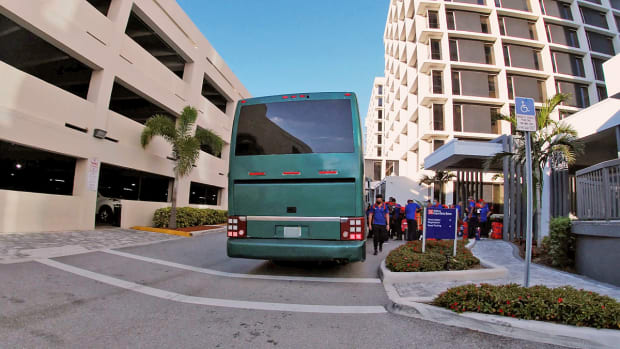
SI Video
Despite reasonable misgivings, the friend does as instructed. The bus pulls up to the hotel and into an alleyway sandwiched between the lobby and the parking garage. There’s one way in and one way out. With the friend’s car now guarding the lone exit, the bus driver parks right behind it. Perfect. Cuban officials do not seem to notice the dark SUV that’s pulling in and turning around, facing the wrong way.
Billy glimpses a pair of unmarked black cars and wonders whether they’re waiting for the bus. He calls a cop friend and asks him to run the plates. One comes back as a rental; the other isn’t registered. He also spies the agent from the freeway. He eyes it all—cars, bus, lobby, alley, streets. Hotel employees begin unloading bags. Players start to shuffle off. Billy’s senses scream. He must take action. “I’m getting out of the car,” he tells Jo. “I see Baby. Get in the driver’s seat.” The clock on the five critical minutes that will determine success or failure begins, right then. Tick . . . tick . . . tick . . .
Back in 2015, Billy heard Jo out. She told him about the Pittsburgh Pirate who had eaten there recently, and the Cuba he described. No resources. Little freedom. Constant oversight.
Where was Jo heading with all this? Billy wondered. Finally, she told him. “If you do something for the right reasons, if you do things from the heart, it works out.” She then explained her thesis: There had to be a better way to bring Cuban athletes to the U.S., one she would discover on her own. It sounded like hubris, if not outright delusion. Then, the kicker: She knew no one who could help her help Cuban athletes like . . . him.
Billy laughed. Come on. Help people defect from Cuba? With no training? No contacts? No experience? “What do you want me to do?” he asked. “Get a helicopter and throw down a ladder and get the boy?”
“Yeah,” Jo replied. “Maybe.”
For weeks, Billy tried to muster the strength to say no. But he was growing bored with police work, and he started to have visions of money that could dramatically change his circumstances. “Sometimes in life you gotta take a chance,” he thought. “Or you’re not living.” Maybe assisting Cubans marked another kind of service. Even then, he resolved to pass. But . . . “I couldn’t,” he says now. “I wouldn’t.”
They started with the basics: reams of research on the lives of Cuban athletes. This immersion unearthed contacts, lawyers, coaches and immigration experts with an intimate familiarity of the landscape. Their method crystallized.
“It’s not human trafficking,” Jo says. “You’re saving a kid. You’re giving them a life.”
Over the years, Billy and Jo each often promised themselves they would stop. Instead, their dynamic solidified. Jo became the architect, overseer of the big picture, the person who connected with the Cubans who sought them out. Billy did Billy, or basically all the other operational tasks. And David, Jo’s husband and an accountant, handled the money, expenses and contracts, while trying to persuade the other two to quit. “He thinks Billy and I are crazy,” Jo says.

The dynamic worked—except for Billy. He traces his doubts all the way back to the first mission but admits they heightened over time. Around 2018, they started to overwhelm him.
It wasn’t his place in the operation that bothered him, but his pay. Whenever they saved another athlete, he told him the same thing: This is for you. This is America, the land of opportunities. But that wasn’t America for him.
David also serves as the athletes’ representative, covering all of their expenses in exchange for a percentage of their earnings (which can vary, depending on the rules of the sport). When White Sox third baseman Yoán Moncada signed initially with Boston in 2015, his contract included a record $31.5 million signing bonus for an amateur. Major League Baseball allows agents to charge up to 5% of any contract. That would have netted the Hastings almost $1.6 million from the bonus alone. That’s when they wiped Billy’s house debt clean.
Billy appreciated his occasional bonuses, but the riches he imagined were hardly materializing. He grew more frustrated: In his view, he was the one taking all the risks. Jo felt the same way about her role. She and David bankroll every operation, which requires massive amounts of upfront cash. Jo sometimes reminded Billy that they were, essentially, gambling on major paydays. “Like going to Vegas and rolling the dice,” she’d say. But Billy struggled to square their lavish life with his own and sometimes felt as if they still treated him like the teenager who walked through those restaurant doors so many years ago.
Billy doesn’t fault the Hastings for his predicament. He says, “I’m not blaming anybody,” and “nobody forced me to do this.”
He has wanted to quit for a long time. After every mission, he’ll lament, “I’m done.” But he’s too loyal. And he hasn’t given up on the payday. Jo maintains that future rewards are coming. “Believe me,” she says, “he will be taken care of. If I get paid, we all get paid.”
Between that and the adrenaline, there’s always just enough to convince him.
Tick . . . tick . . . tick. Four minutes remain. Jo, worried because their SUV is pointing the wrong direction, yells, “Billy, it’s a one-way street! How obvious is that?”
He ignores her, opens his car door and tells her to climb into the driver’s seat. It’s go time. Billy stalks toward the bus as Jo climbs behind the wheel. But in an attempt to move the seat forward, her wig—which she had put back on—falls off, entangling with a flip-flop on the floor.
Three minutes.
As Baby J exits the bus, he hugs a friend and hands over his last 100 pesos. “Go,” the friend tells him. “I wish I had done what you are about to do.”
Two minutes.
Baby J separates from his teammates, lingering on the fringe near the lobby entrance. He makes eye contact with Billy, quick and stern, so they’re clear but don’t arouse suspicion. Baby J nods at Billy, who nods back. Seconds pass. Tick . . . tick . . . tick . . .
One minute.
Baby J takes off running—away from his teammates and toward Billy, an MLB career and his new life. He dashes so fast he smashes into Billy halfway through their sprint to the car. Cubans will soon marvel at the speedy getaway, making memes comparing Baby J to the cartoon Road Runner or Usain Bolt.
At the SUV, they jump in. Billy pounds on the dashboard, but Jo is still struggling, still tangled. Eventually she manages to separate wig from flip-flop, as the shoe tumbles to the pavement. Leave it, Billy says.
“Go! Go! Go!” he shouts.
Jo gathers herself and punches the gas pedal, driving away from her friend who’s blocking the exit and speeding easily out the wide-open entrance, just as Billy planned. “We’re gone!” she screams.
Billy turns to glance at the young man now safely in the back seat. Baby J is smiling. Free. And now, they can refer to him by his real name: César Prieto.
César first called Jo over FaceTime in late 2019, on the recommendation of a friend. “All I want to do is play baseball,” he told her, before sending a picture of himself, at age 2, cradling a home-carved bat. “I will do whatever you tell me to,” he said.
César grew up on a farm in Simpatia, a hamlet in the Cienfuegos Province. His father introduced him to baseball before he could walk and took him to his first game at age 6. But it wasn’t until he was about 15 that the boy started to flash immense promise. He secured a spot on the national team and doubled his training, focusing on plate discipline and conditioning and honing his defense at second base and shortstop.
His prospects elevated in 2017, while starring for Cuba at the U-18 Baseball World Cup, held that year in Thunder Bay, Canada. His slash line—batting average, on-base percentage, slugging percentage—was staggering at .581/.606/.646. Major league teams took notice.
In Canada, César peeped another world. He saw opponents using fancy, new equipment. They trained in state-of-the-art facilities. No one took the passports from the players on other teams, because they were free to leave at any time. That his team often beat those opponents forced César to consider the same notion as defectors who left before: How good could he be if he played somewhere else? Upon returning home to Cuba he sat down with his father, reviewed his options and settled on the only one that made sense: leaving.
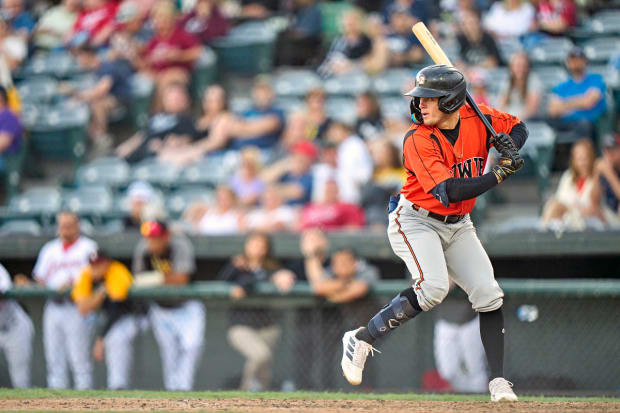
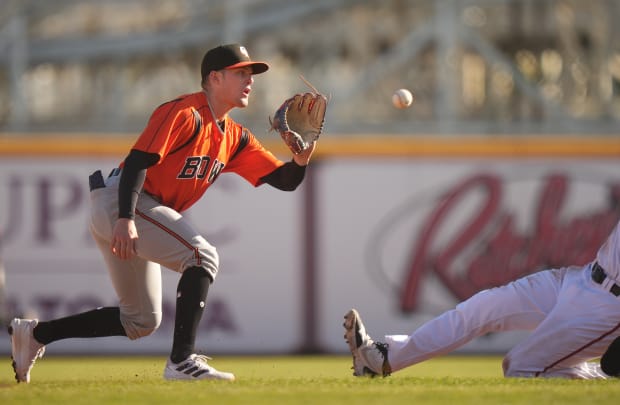
Erick W. Rasco/Sports Illustrated (2)
Immediately after their first call, Jo began her research, talking to “a bazillion” people familiar with the promising 20-year-old infielder. No issues came up. Most pointed to an “innocence” about him.
Meanwhile, Billy still needed convincing. Most of the athletes they liberated found their newfound autonomy overwhelming. Some lost themselves in dating apps. Some struggled with alcohol addiction. Some committed domestic violence. Some left the Hastings group for other representation before massive contract extensions, like Moncada, who signed his with the White Sox in 2020. So far, none have reached the level of stardom all anticipated.
Meanwhile, the operation sagged under its own weight. The Hastings’ dedication to caring for their clients after their escapes could lead to expenses as high as $1 million per athlete, cutting deeply into the group’s profits. After Moncada’s record bonus, Major League Baseball changed its rules for signing international players, allotting each team a set amount to spend. Because César arrived in the U.S. toward the end of the signing cycle, most MLB teams had already used up their funds. César signed with Baltimore for just a $650,000 bonus. The Orioles offered the highest bid and, with no star middle infielders signed to big contracts, the clearest path to the majors. Had Billy and Jo used a riskier method to get César to the U.S. earlier, that figure—and their cut—would almost certainly have been higher.
Billy not only knew those challenges; they scared him. Why embark on another operation then? He didn’t want to.
But tell Jo no? Wouldn’t. Couldn’t.
Billy keeps glancing at César in the backseat of the SUV. He’s silent, still processing. They stop to hide in the last place anyone would look for a Cuban baseball player who just defected: a nearby mall. When they leave roughly 20 minutes later, Billy slides back into the driver’s seat and drives to the apartment where Jo’s friend lives, trying to soothe her concerns. She’s certain they’re all headed to jail.
In an attempt to quell the awkwardness, they spend some time recapping the previous six months. How the pandemic obliterated Cuba—shutting down hospitals, dwindling food supplies and halting most air travel—and forced delay after delay in César’s escape. How César had started to waffle, unsure whether he had made the right choice. How he begged them to send a speedboat, but they declined. Too dangerous. How Billy and Jo went to Mexico City, believing the national team would travel there to pick up their visas for future trips. But the team never came, and they netted little beyond the new shoes Jo bought there.
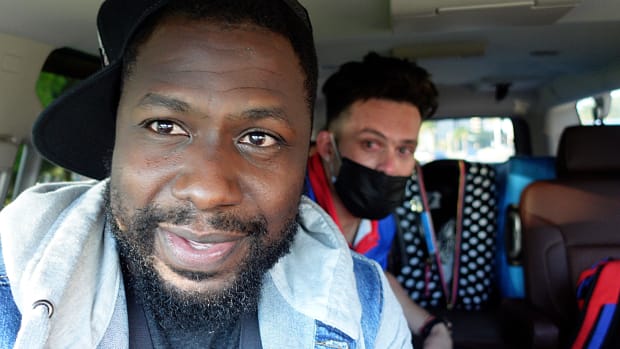
SI Video
As César waited, COVID-19 raged and the Cuba economy crumbled, the number of defections—athletes and nonathletes alike—from Cuba spiked. News reports identified at least nine of César’s teammates as defecting from the national team at the Under-23 World Cup in Mexico in October 2021. The anguish in his messages elevated.
You gotta help.
Please don’t leave me, man.
Come get me.
“Take it easy,” Billy wrote back. “Wherever you at, I’m gonna come for you. Once I make up my mind to get ya, there ain’t nothing gonna be able to stop me.” Sitting there, Billy considers what might have run through César’s head as he bolted. What César doesn’t know is that in those 10 frantic seconds, he had given Billy what always brings him back. The thrill of the chase, a mission completed. Billy lived for those 10 seconds.
Three months later, César trotted onto a baseball diamond in Clearwater, Fla., on a sun-kissed, cloudless morning. He was training there while waiting to sign with an MLB team. Seven had so far expressed interest in the defector.
One of his private coaches, Andrés Blanco, a defensive specialist who played 10 MLB seasons, worked with him on the field. Blanco said César had improved by 80% since that sprint in Miami. Blanco believed César will not only play in the majors but start, excel and maybe one day win a Gold Glove. In Florida, César changed his diet and, with Billy’s help, added 20 pounds of muscle to his lean frame. He ate, practiced, called home and played video games.
“From here,” César says, “it should be easier.” But what about those teammates he left behind? MLB officials and the Cuban Baseball Federation struck a deal in late 2018 that would have allowed players to leave for the U.S. without defecting. But then President Donald Trump rejected the agreement the next year and closed the U.S. embassy in Havana. The best players continued to choose their only option: defection, risks be damned. Billy and Jo had conducted these missions for nearly a decade, and nothing had changed. Their jackpots remained few and far between. It became harder to find the point.
Still, hope, as they say, springs eternal. This spring the Orioles shipped César to their high-A minor-league affiliate, the Aberdeen IronBirds. Billy moved to Maryland with him, sleeping on a thin, fold-out bed in the apartment César shares with a teammate. It meant more time away from his kids, but, in Billy’s view, more chance to strike it big and give them the secure childhood he never had.
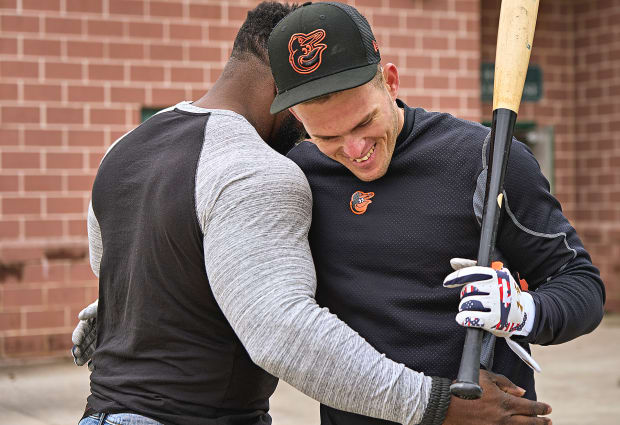
Erick W. Rasco/Sports Illustrated
In 25 games for the IronBirds, César hit .340 and muscled out seven home runs, thanks, in part, to all of Billy’s workouts. The Orioles promoted him to the Double A Bowie Baysox in late May, where in 45 games he has hit .280 and slugged .371. His relationship with Billy evolved, too, as the beefcake extractor became less of a minder and more of a father figure. César refers to him as his “second dad”—one who beamed with pride when César received his permanent residency papers May 28, four days after his call-up and exactly one year after he defected.
Billy is considering a future with César. As a manager, or business partner: as anything, really, other than what he is.
On the day of his escape in Miami, César musters the courage to call home. Jo and Billy study him from a distance, watching him sob. Billy promises himself at that moment: He will never go back. It is settled. César hangs up, then beelines for Billy. The men embrace. “U-S-A,” César says softly, as he hands Billy his Cuban national team jersey, the red top with blue sleeves, emblazoned with “9” and “Prieto.”
Billy stifles tears, hoping his own children would one day understand what he lives for, for those 10 seconds, for those “kids.” Maybe César will change his life. Maybe he will get paid.
Maybe he will go back.
Inside that apartment, Billy balances all those emotions. He is grateful and energized, deflated and anxious. He knows he can’t save them all, but he has tried, and in trying, he has lost so much. That’s the life of a superhero. Isn’t it?
• For U.S. Rugby, the Time Is Now. Maybe.
• The Unbreakable Bond of Stefon and Trevon Diggs
• Who’s Still Got Milk?
• ‘Oh, You Look Like the Rock’: Finding Rocky’s Family